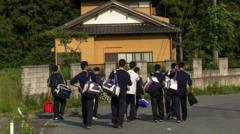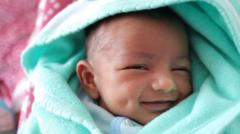A striking survey conducted by the Japan Association for Sex Education reveals that 80% of teenage boys and over 25% of girls in Japan have yet to experience their first kiss, marking the lowest rates since 1974. Pandemic disruptions are believed to have contributed to this decline, further exacerbating concerns related to the nation's dwindling birth rate.
Japan's Teen Boys Experience Unprecedented Decline in Romantic Milestones

Japan's Teen Boys Experience Unprecedented Decline in Romantic Milestones
A recent survey indicates that Japanese teenagers are struggling with dating and intimacy, with many boys and girls reporting no experience with their first kiss or sexual intercourse.
In a phenomenon that highlights changing social dynamics, a comprehensive study has revealed startling statistics about the romantic experiences of Japanese teenagers. The latest survey, conducted by the Japan Association for Sex Education (JASE), shows that a staggering 80% of high school boys aged 15-18 have not yet had their first kiss. The situation is not much better for girls, with only about 25% of female students reporting similar experiences. These findings signify a drastic drop in teen romantic engagement, the lowest since Japan began tracking these trends in 1974.
The survey, which involved over 12,500 students from junior high schools, high schools, and universities, explored a range of intimate experiences including kissing and sexual intercourse. The research, conducted every six years, has documented a downward trend since 2005 when approximately half of teens reported having kissed. Alongside the kiss-related statistics, the report indicates a troubling decrease in sexual activity among the youth, with only 12% of high school boys and nearly 15% of girls having engaged in sexual intercourse, down from previous years.
Experts suggest that the COVID-19 pandemic has played a significant role in this decline. School closures and social distancing measures coincided with a critical period of sexual awakening for these adolescents, affecting their ability to form romantic connections. Yusuke Hayashi, a sociology professor at Musashi University, pointed out that this disruption could be detrimental during a formative time for young people's sexual interests.
Interestingly, despite the drop in kissing and sexual encounters, the survey noted an increase in the number of teenagers who reported masturbating, reaching record highs across various demographics. This complex trend raises questions about shifting attitudes towards sexuality and intimacy.
These findings come at a time when Japan grapples with alarming demographic challenges. Earlier this year, a separate study underscored the growing concern surrounding "sexless" marriages in the country. The Prime Minister has previously warned that Japan’s declining birth rate poses existential risks, projecting that the current population of approximately 125 million could plummet to fewer than 53 million by century's end if current trends continue. Many factors, such as rising living costs and increased educational and employment opportunities for women, contribute to this demographic shift as individuals choose to have fewer children.
Japan's aging population continues to grow, prompting significant shifts in various industries, including the surprising move by Oji Holdings, a diaper-making company, which announced plans to cease producing baby nappies in favor of adult diapers.
As Asian countries grapple with similar challenges, the question remains: How can societies effectively address falling birth rates while fostering healthy romantic relationships among burgeoning generations?





















